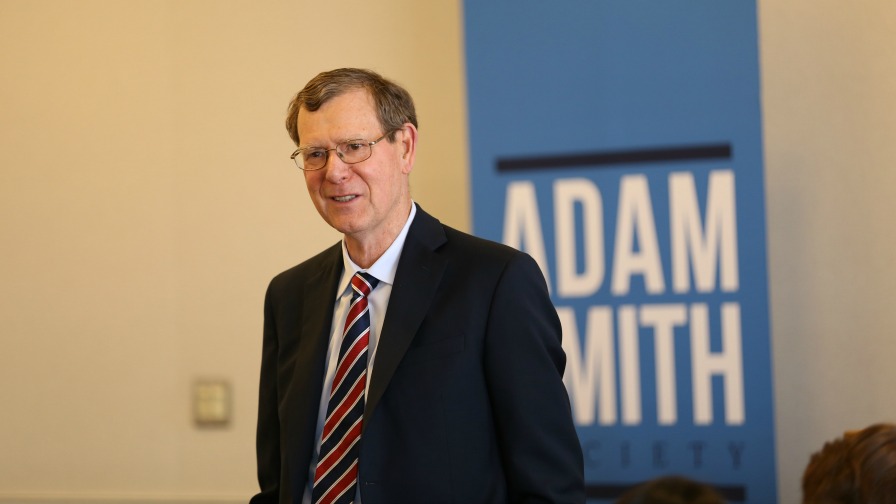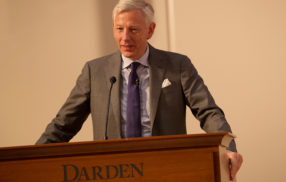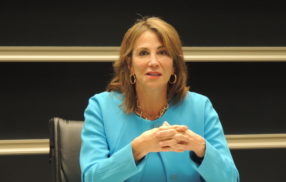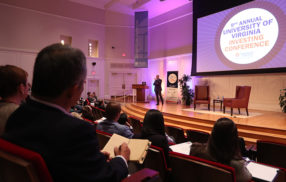
Former BB&T CEO: Follow the Free-Market Path to Finding Happiness
By Dave Hendrick
Arguing one side of what he termed the “philosophical fight for the future of America,” former BB&T Chairman and CEO John Allison said he believes true capitalism is the surest way to promote human flourishing.
Allison, who also served as CEO of the libertarian-minded CATO Institute, came to the University of Virginia Darden School of Business on 4 February as the keynote speaker for Liberty Week, a weeklong series of speakers and events hosted by the Darden chapter of the Adam Smith Society, the nationwide association of MBA students and business leaders who promote discussion about the moral, social and economic benefits of capitalism.
The former banker and current professor at Wake Forest University School of Business believes deeply in the power of individual liberty and capitalism, which he argues go hand-in-hand with innovation, creativity and happiness.
“Capitalism rewarded innovation and creativity and allowed the common man to be rewarded for his actions,” Allison said, calling the economic system the most impactful invention of the last several millennia.
And while the United States was founded on principles of the sorts of self-reliance and pursuits of happiness that a libertarian such as Allison cherishes, he cautioned against considering the U.S. a capitalist nation.
“We don’t live in a free market in the United States,” Allison said. “It’s not capitalism.”
Instead, Allison said the country practices a sort of “crony capitalism,” with artificially stunted competition and “corporate welfare” undermining real capitalism, which is why many people hold the concept in low regard.
In Allison’s view, both dominant political parties tend to produce policies that are anathema to the “classical liberal tradition” supporting life, liberty and the pursuit of happiness, with both sides proposing government solutions to issues best handled by the individual.
The government, in Allison’s view, should exist solely for the three functions of maintaining national defense, a police force and an efficient court system.
Despite his assessment of its flaws, Allison said the U.S. is among the countries that allow for the flowering of ideas, innovation and entrepreneurship, as the country and others like it give citizens the ability to “think for yourself.”
“Without entrepreneurs, there is no human progress,” Allison said. “They are out of-the-box thinkers. They integrate things in different ways. They try and fail often. For every Wal-Mart, there are 100,000 failed Wal-Marts.”
The failure of social systems like socialism and communism is due in part to their failure to allow for innovation and entrepreneurship, Allison said.
Allison encouraged Darden students to set a sense of purpose and pursue achievements to the best of their ability, arguing that true happiness and self-esteem will likely come from the value they derive from their own work by performing to the best of their ability and creating value for others.
“For everybody in this room, the single biggest driver of self-esteem is your work,” Allison said. “You’ll never fool yourself about how well you do your job. If you don’t do it as well as you can do, you will lower your self-esteem.”
The University of Virginia Darden School of Business prepares responsible global leaders through unparalleled transformational learning experiences. Darden’s graduate degree programs (MBA, MSBA and Ph.D.) and Executive Education & Lifelong Learning programs offered by the Darden School Foundation set the stage for a lifetime of career advancement and impact. Darden’s top-ranked faculty, renowned for teaching excellence, inspires and shapes modern business leadership worldwide through research, thought leadership and business publishing. Darden has Grounds in Charlottesville, Virginia, and the Washington, D.C., area and a global community that includes 18,000 alumni in 90 countries. Darden was established in 1955 at the University of Virginia, a top public university founded by Thomas Jefferson in 1819 in Charlottesville, Virginia.
Press Contact
Molly Mitchell
Senior Associate Director, Editorial and Media Relations
Darden School of Business
University of Virginia
MitchellM@darden.virginia.edu







